

Stress, by definition, is a "Involuntary physical & psychological response to a stressor".
What is Stress? - The American Institute of Stress. Stress is not a useful term for scientists because it is such a highly subjective phenomenon that it defies definition.

3 Types of Stress and Health Hazards - Shawna Freshwater, PhD. Stress is a feeling that people have when they are struggling to cope with challenges related to finances, work, relationships, environment, and other situations.

Moreover, stress is felt when an individual perceives a real or imagined challenge or threat to a their well-being. People often use the word stress interchangeably with anxiety, feeling anxious, fearful, nervous, overwhelmed, panic, or stressed-out. Stress is the body’s natural defense against real or imagined danger. It flushes the body with hormones to prepare systems to evade or confront danger.
This is known as the “fight-or-flight or freeze” response. The body is an intelligent operating system, but the body can not determine the difference between life threatening external threat from imagined or perceived non-life threatening stressors. The Side Effects of Stress - 8 of the Most Common. Medically reviewed by Carmen Fookes, BPharm Last updated on Mar 12, 2020.
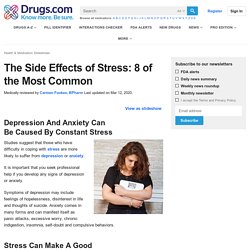
Depression And Anxiety Can Be Caused By Constant Stress Studies suggest that those who have difficulty in coping with stress are more likely to suffer from depression or anxiety. It is important that you seek professional help if you develop any signs of depression or anxiety. Symptoms of depression may include feelings of hopelessness, disinterest in life and thoughts of suicide. The Effects of Stress on Your Body. You’re sitting in traffic, late for an important meeting, watching the minutes tick away.
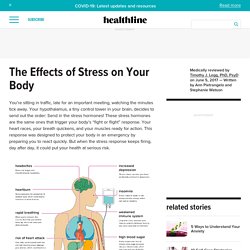
Your hypothalamus, a tiny control tower in your brain, decides to send out the order: Send in the stress hormones! These stress hormones are the same ones that trigger your body’s “fight or flight” response. Your heart races, your breath quickens, and your muscles ready for action. This response was designed to protect your body in an emergency by preparing you to react quickly. Why So Many People Are Stressed and Depressed. Everywhere you look today, people are stressed out.
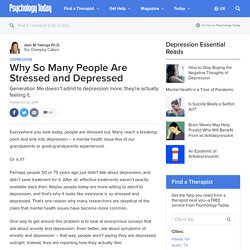
Many reach a breaking point and sink into depression – a mental health issue few of our grandparents or great-grandparents experienced. Or is it? Perhaps people 50 or 75 years ago just didn’t talk about depression, and didn’t seek treatment for it. After all, effective treatments weren’t exactly available back then. Maybe people today are more willing to admit to depression, and that’s why it looks like everyone is so stressed and depressed. Article continues after advertisement One way to get around this problem is to look at anonymous surveys that ask about anxiety and depression. That was my goal in a study just published in the journal Social Indicators Research. But when people were asked directly if they “felt depressed,” that didn’t change much between the 1980s and the 2010s.
How can that be? This also means that the rise in mental-health concerns isn’t caused by people being more willing to admit to being depressed. 1. 2. 3. The Main Causes of Stress. Stress is normal and, to some extent, a necessary part of life.
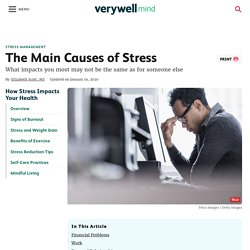
Despite it being something everyone experiences, what causes stress can differ from person to person. For instance, one person may become angry and overwhelmed by a serious traffic jam, while another might turn up their music and consider it a mild inconvenience. A fight with a friend might follow one person around for the rest of the day, while another might easily shrug it off.
What's causing you stress may already be something you're abundantly aware of. But given the importance of keeping stress in check when it comes to mitigating the effects it can have on your physical and mental health, it's worth opening yourself up to the possibility that other factors may be at play, too. Financial Problems According to the American Psychological Association (APA), money is the top cause of stress in the United States. The biggest cause of stress in America today. Money continues to be the leading cause of stress for Americans, a new survey finds.
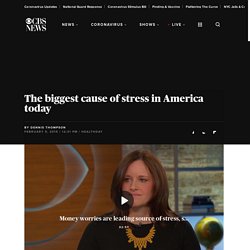
Overall, stress in the United States is at a seven-year low, and average stress levels are declining, the American Psychological Association poll found. But money worries continue to nag at the American psyche, despite the ongoing economic recovery, the association says in its report released Feb. 4, titled Stress in America: Paying With Our Health. Financial worries served as a significant source of stress for 64 percent of adults in 2014, ranking higher than three other major sources of stress: work (60 percent), family responsibilities (47 percent), and health concerns (46 percent).
Nearly three out of four adults reported feeling stressed about money at least some of the time, and about one in four adults said they experienced extreme stress over money during the past month, according to the report. Stress at the workplace. Stress Management. While it may seem like there’s nothing you can do about stress at work and home, there are steps you can take to relieve the pressure and regain control.
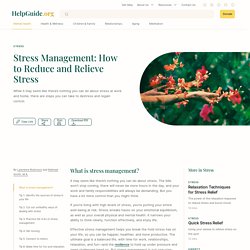
Coping with stress at work. Everyone who has ever held a job has, at some point, felt the pressure of work-related stress.
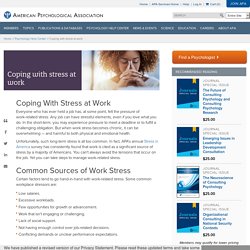
Any job can have stressful elements, even if you love what you do. In the short-term, you may experience pressure to meet a deadline or to fulfill a challenging obligation. Kelly McGonigal: How to make stress your friend. (16) How stress is killing us (and how you can stop it).